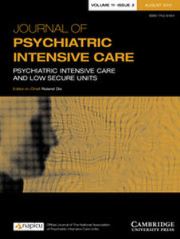Article contents
Psychotic disorder NOS with heterotopia
Published online by Cambridge University Press: 10 April 2007
Abstract
Background: Heterotopia are believed to result from faulty neuronal migration. Formerly considered to be extremely rare, with the availability of MRI reports they have appeared more frequently.
Case details: We describe a 42 year old man with episodic disinhibition (violent and sexual) with disorganized thinking and behaviour, and a 20 year history of a diagnosis of schizophrenia. Soon after admission there were vague paranoid delusions. Initially, the cognitive state was impossible to access, but cognitive deficit was later demonstrated using the Mini Mental State Examination (MMSE). Although there was no clear evid??ence of delirium, the MMSE score subsequently improved, as did the disinhibited behaviour.
Results: CT revealed no abnormality. Brain MRI, however, revealed multiple bilateral subependymal heterotopia (SEH).
Conclusion: It is possible for SEH to be associated with a schizophrenia-like syndrome. CT is not sufficient and MRI is required to exclude SEH.
- Type
- Case Report
- Information
- Copyright
- Copyright © NAPICU 2007
- 6
- Cited by


